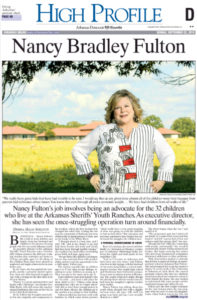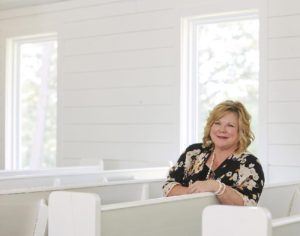High Profile: Nancy Fulton brings empathy, practicality as leader of Arkansas Sheriffs’ Youth Ranches
09/23/2019
Fulton’s job involves being an advocate for the 32 children who live at the ranches
Originally published in the September 22 edition of the Arkansas Democrat-Gazette High Profile section by Debra Hale-Shelton and photos by John Sykes, Jr.

BATESVILLE— Nancy Fulton’s life is full of work, hobbies and family, from her husband and children to the dozens of young people who live on a rural Arkansas ranch.
As executive director of the Arkansas Sheriffs’ Youth Ranches since October 2013, Fulton oversees the 600-acre working ranches that currently are home to 32 boys and girls, ages 5 to 20. Many of the children there have been abused or neglected and might otherwise be in state foster care.
In six years, she has guided the nonprofit, mostly a privately funded operation, from one with financial struggles to one with a savings for the first time in its 43-year history.
“Nancy is a great administrator and leader with a big heart,” says former Gov. Mike Beebe, who will emcee the ranches’ annual fundraiser, this year set for Oct. 16 at the Little Rock Marriott.
At 61, Fulton has brought practicality but also empathy and compassion to the position, which she first declined but changed her mind after visiting the site near the community of Bethesda, just west of Batesville in Independence County and on the banks of the White River.
“I thought about it a long time, and I said, ‘OK. This is my chance to go and help these hearts and souls and minds that have been through terrible trauma,’” she recalls in her ranch office overlooking green fields and large, aging trees.
“We get them [the children] treatment, but we also surround them with predictability and love and the opportunity to be a child again,” Fulton says.
The ranches usually take in children ages 6 to 17 but often accept siblings, resulting in some children as young as 2. They can stay at the ranch up to age 21.
Some children come from parents who are “in crisis … and need a safe place for their child to live.” Others come from grandparents who are no longer physically able or don’t have enough money to care for them. Always, the children go to the ranches at no charge to their families.
Fulton recalled her previous work with families in which some foster parents “didn’t really have a true understanding of what was going on with the children or how to help them.” But education and personal experience have helped her understand the struggles the children face.
A PERSONAL UNDERSTANDING OF ABUSE
Born in Louisiana, she moved with her family to Clarendon in Monroe County, part of Arkansas’ Mississippi Delta, between the eighth and ninth grade for her stepfather’s job.

Arkansas Sheriffs’ Youth Ranches CEO Nancy Bradley Fulton – Photo by John Sykes Jr.
“And so I became an Arkansan and have been one ever since,” says Fulton, who lives in Hot Springs with her husband of two years, Greg Fulton, a retired mathematics teacher who taught high school and Henderson State University courses. Greg is now an adjunct teacher at Henderson. The couple connected online, though she already knew who he was because he had been her daughter’s algebra teacher years earlier.
Nancy Fulton was talking about her youth when, abruptly but with a slightly nervous voice, she says, “OK, well, I’m going to go back and say, I was sexually abused as a child.”
The abuse began when she was 7 and ended at 12.
“The perpetrator quit, but I didn’t tell my family so I carried that secret and that burden” and felt “a great deal of fear and sadness until that person died,” she says.
Though she had “difficulty connecting with people emotionally,” she excelled academically despite feeling ashamed and broken. She began noticing that others who had been traumatized sometimes developed addictions or other problems.
That observation ignited a curiosity that led her to major in biology in undergraduate school at Arkansas State University and prompted her to get her master’s degree in social work at the University of Arkansas at Little Rock. She started graduate school after her two children started preschool and wanted to return to work outside the home. She also wanted to understand why some people survive emotional trauma and others do not.
Fulton says she first sought treatment for her own trauma when she was pregnant with her now 33-year-old daughter. Later, when Fulton was in her 30s, she “decided that I wasn’t going to keep this secret necessarily anymore” and started sharing it with others: “I remember the first time I looked at somebody and said, … ‘I’ve been sexually abused,’ and they were so shocked.”
“We really have great kids that have had trouble to be sure. I would say that at any given time almost all of the children were here because their parents had substance-abuse issues.You know that cuts through all socio-economic weight. … We have had children from all walks of life.”
Sharing her own experience has helped some children open up when talking with her.
They “don’t have to worry” that she will judge them, she says. She’s able to tell them: “You did not do this. This was not your fault.”
“A lot of these children think they are irretrievably broken. I will say to them, ‘If I can make it, you can make it. … Don’t let that person who stole something from you win.’”
Many abused children “haven’t given themselves permission to be angry about” their situation. “So, I’m angry for them. … The message from me to them is, ‘you were powerless then, but you are safe now.’”
The abuse “was someone else’s choice,” Fulton tells the children. “You deserve that adult to treat you with kindness and appropriate boundaries.”
People too often wrongly think that the children they know are not abused. But statistics show otherwise, Fulton says. “There’s just so many things that we just don’t look at as red flags because we just innocently think no one is targeting [our] children.”
Be observant and ask questions, Fulton advises. Abuse “is happening in your neighborhood. It is happening in your community. And it’s wrong to turn a blind eye to it because it’s uncomfortable.”
Fulton says most of her job involves being an “advocate for the children.”
PROM NIGHT
Erin Cook, now 23 and living in West Plains, Mo., moved to the ranch a week before her 17th birthday after making “some repetitive bad decisions.”
“She cared about [our] well-being and us feeling at home,” Cook says of Fulton. “You always had her in your corner, and I know that to this day I still do. I love her like family. That’s how the ranch made me feel — like I was a part of one big blended happy family.”
When Cook’s senior prom week approached, “Mrs. Nancy” was there for her and another young woman. First, Fulton took them to get their hair styled at a salon, where they talked about “my future and boys,” Cook recalled. Come prom night, Fulton went to the girls’ ranch house “and got us ready just like a mother would do,” Cook says.
“That’s the thing about her. She has a huge heart and just wanted to show us love in any way she could,” Cook says. “They got me back on track and got me the help I needed in a loving and caring environment.”
Cook stayed at the ranch almost two years until she finished her senior year. “Not sure where I’d be if it weren’t for” the ranch and Fulton, she says.
Private donations account for 90% to 95% of the ranches’ funding, says Matthew Cleveland, chief development officer at the ranches.
This year, the fundraiser’s 24th Annual Arkansas Children’s Award will be presented to Gov. Asa Hutchinson, who has worked to improve the state’s foster-care system and who signed a bill this year to reform Arkansas’ juvenile justice system. The event begins at 6 p.m. with a reception and silent auction. A dinner and program follow at 7 p.m.
Tickets are $200 per person. Other donation opportunities also are available at youthranches.com.
“Our goal is to raise about 10% of our annual budget” at the dinner, Cleveland says. That annual budget is about $2 million.
Beebe, a Democrat and the organization’s first honoree, says he suggested honoring Hutchinson, a Republican, “because he’s done a lot for kids.”
SAFE SPACE
The ranches, which employ about 25 people, evolved from a mobile home on several acres. There, two brothers, ages 7 and 5, found a safe space. Since then, the ranches have housed more than 2,100 young people, and one of those brothers has joined the ranches’ board of trustees.
When Fulton became executive director, the ranches were coming back from the nationwide recession but still faced obstacles. It became her job to make recommendations to the board on how to move forward within budget.
“We determined over time … that we really needed to just pull back into one campus,” she says.
“We’ve been able to stabilize financially and actually have gotten reserves in the bank, which we’ve never had before,” Fulton says. “We’ve started an endowment that will continue in perpetuity for the benefit of the ranch. And then we’ve been able to refurbish the campus this year. So, we’re really pleased with what we’ve been able to accomplish in six years.”
Five of the ranches’ houses are now open. Each is home to up to eight children and their house parents. Outdoors, the children can play and help with the ranch’s cows, pigs, goats, chickens, mini-horses, llamas and rabbits.
Because sheriffs started the ranch in 1976, Fulton says many people wrongly “think that it’s like a prison farm or for juvenile delinquents.” But in reality, she says, the sheriffs started it because they kept seeing children who had been abandoned or neglected. “And they wanted to help.”
“We really have great kids that have had trouble to be sure,” Fulton says. “I would say that at any given time almost all of the children were here because their parents had substance-abuse issues. You know that cuts through all socio-economic weight. … We have had children from all walks of life.”
Fulton, who remarried in 2017, enjoys bringing the couple’s two dogs, Panda and Beaux, to her ranch office. She keeps a crate there for when they do accompany her. By the time she married Greg, she had two adult children by her first marriage: Sara Bailey, 33, of Hot Springs, a student who works in retail sales; and her son, Wade Bailey, 32, an electrical engineer living in Peachtree City outside Atlanta. She also has two grandchildren.
At the farm, the younger ranchers regularly gather in each home for “family” meals. Many youngsters come to the ranch with hunger issues and tend to hoard food because they sometimes had to struggle to find food for themselves, especially if their parents were high, spent all their money on drugs and saw their electricity or water cut off. So, ranch employees keep a basket of healthy snacks readily available in each house, Fulton said.
“We have a lot of children who … [previously] existed on microwave macaroni and cheese, chicken ramen noodles and hot dogs … something that was relatively inexpensive that children could make themselves,” she said.
The youngsters attend school in Batesville, can join sports teams, and go to church on Sundays. They can stay while working or going to college even after high school for a time.
“We are passionate about doing the right thing for children,” Fulton said.
As for goals she still hopes to achieve at the ranch, Fulton said she would like to see the reserve fund grow from its current total of about $5 million to $20 million.
That, she said, “would really ensure the success of the [ranches] financially.”








